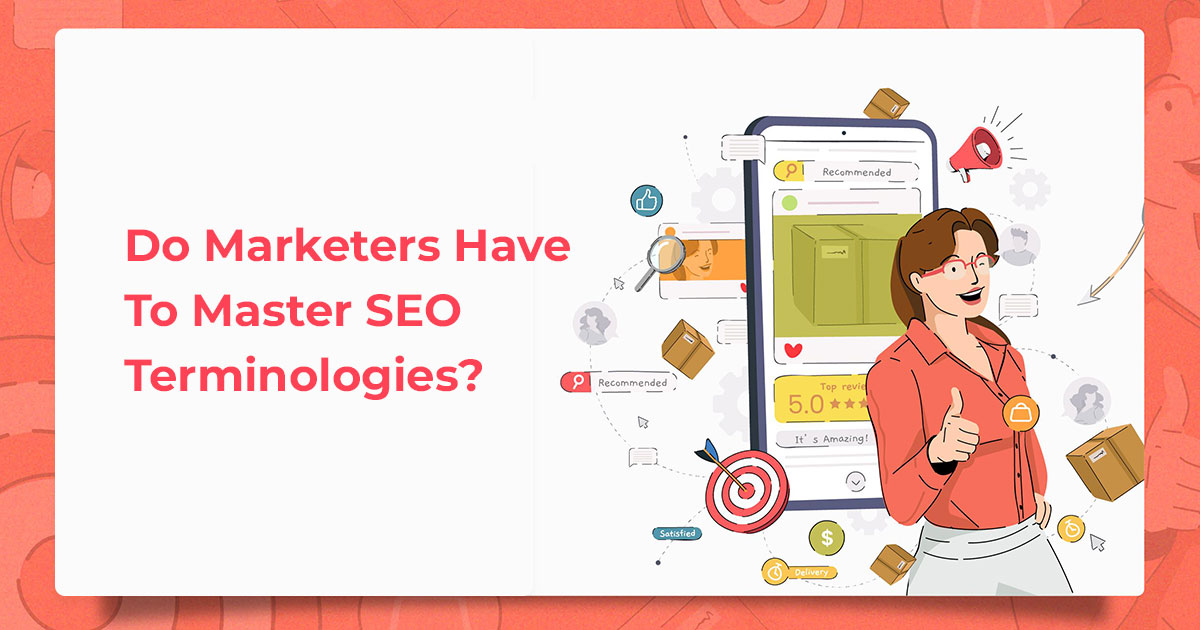If you’re familiar with the term “in the eyes of the algorithm”, you’ve probably been bamboozled by a smooth criminal selling “affordable SEO services” on Reddit.
For a lot of marketers, SEO can be an extremely foreign concept. There’s a lot of technical jargon and terminologies that go with it. “In the eyes of the algorithm” definitely isn’t one of them.
Marketers don’t have to be SEO experts. The key is understanding enough to get the ball rolling. But, do marketers really need to learn SEO terms?
Why Should Marketers Learn SEO Terminologies?
Marketing and SEO complement each other. Strategies that take both into account help businesses scale faster. SEO helps brands get closer to their target audience naturally.
It’s one of the best ways to bring traffic in that can ultimately lead to better sales. But, the benefits don’t stop there. Here are two key reasons why marketers should learn SEO:
Your Website is the Focal Point of all Campaigns
All roads in your marketing campaigns should lead to your website. It doesn’t matter which platform you’re doing marketing in.
The landing page for these campaigns is usually a product page or a contact page where prospects can learn more about your products or services.
Long-Term Brand Building
The goal of SEO is to build trust and authority within your niche. This can be done by providing your target audience with valuable content. SEO simply becomes the best medium.
If you want to build your brand for the long term, build trust, and gain authority, there’s no better starting point than your own website.
SEO Terminologies Every Marketer Should Know
Learning SEO can feel like studying an entirely different language. But, once you get the hang of it, mastering these SEO terminologies can help you develop better strategies for your brand.
On-Page, Off-Page, and Technical SEO
SEO can be categorized into on-page, off-page, and technical SEO. Here’s a quick rundown on each:
- On-page SEO: Elements you can see on your website. This includes the copy on your pages, headers, title tags, photos, CTAs, internal links, and the content you publish.
- Off-page SEO: These are efforts done to improve your search engine rankings that aren’t done on your website. Common practices include link-building, social media campaigns, paid marketing, and cold email marketing.
- Technical SEO: Website, back-end, and server optimizations that can improve ranking factors such as page speed and indexing.
Backlink Building
Backlinks are links to your site from another website. It’s one of the most crucial ranking factors in Google’s algorithm.
Think of it as a vouching system. The more relevant and authoritative sites link back to you, the better your online reputation becomes.
Backlink building is one of the most difficult tasks in SEO. If you’re looking into this yourself, check out this article from the Spacebar Collective covering free tools for backlink building.
Page Speed
How fast your website loads plays a huge role not only for SEO ranking factors but for user experience as well. Site speed or Page speed is a metric that helps you with this.
To check how fast your website loads, you can use Google’s own PageSpeed Insights. It can help you analyze what you can do to improve your speed on both desktop and mobile devices.
Indexing
Google uses an algorithm to rank websites. But, before it even considers your website for ranking, it needs to be “indexed”.
Newer sites or those that have poorly structured can expect slower indexing times. Some may not even be indexed at all.
If you want your site to be indexed faster, you need to structure content in a way that makes sense to both human readers and Crawlers.
Crawling
Google uses “Spiders” to crawl the web. These crawlers gather information about a site, its content, and its relevance to search queries.
If a site provides enough quality information that can be helpful to users, it has a higher chance of being indexed.
SERP
The Search Engine Results Page (SERP) is the page you get after typing in a query. It shows both organic and paid results.
If a page is already ranking and is structured optimally, Google can present it as a “featured snippet”. These are special boxes that can quickly answer user queries.
Key Takeaways
SEO is a constant learning process. It’s part of a dynamic algorithm that constantly updates to provide a better user experience. So, if you want to learn more about SEO, consider the following:
- Learn basics such as on-page, off-page, and technical SEO.
- Internal and external link-building are both necessary.
- Pages on your site can’t be ranked if they’re not indexed.
- Structure content to make it easier for crawlers to understand them.
- SEO is one of the best ways to build long-term authority for your brand.


